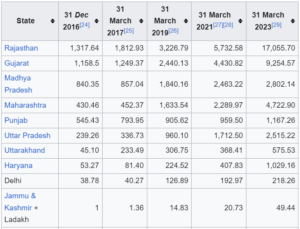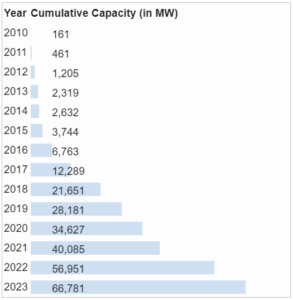
PLI scheme in solar industry: The production-linked incentive scheme offers a strategic initiative to make India a global leader in solar industry. This move will bolster the domestic manufacturing sector and reduce the country’s dependence on imports, particularly from China. The Union Budget of 2024 reiterated India’s commitment to sustainable economic growth in tune with the ambitious goal set at COP26 to achieve net-zero emissions by 2070. The budget has allocated significant resources to various environmental initiatives, including renewable energy, electric mobility, green hydrogen production, climate adaptation programmes, and nature conservation.
A key driver of this agenda is the PLI scheme for solar photovoltaic module manufacturing, aimed at reducing the industry’s reliance on Chinese imports. This scheme is a strategic response to the growing environmental concerns and the shift towards sustainable energy sources.
READ I Kerala vs Centre: The state must balance welfare spending with fiscal prudence
Importance of the PLI scheme
The PLI scheme focuses on enhancing domestic manufacturing capacities, aligning with the objectives of financial independence and empowerment. It seeks to create jobs and foster national pride in supporting India’s industrial growth, providing incentives for local production. The scheme is expected to have a positive impact on small businesses and ancillary industries, improving community life quality by generating employment and entrepreneurial opportunities.
The PLI scheme also plays a crucial role in fostering innovation and supporting research and development within the solar industry. By providing financial incentives, the scheme encourages companies to invest in cutting-edge technologies and innovative solutions that can enhance the efficiency and cost-effectiveness of solar modules. This focus on innovation not only strengthens India’s position in the global solar market but also drives technological advancements that are crucial for the transition to renewable energy sources. The scheme’s support for R&D activities helps to cultivate a knowledge-based economy and ensures that India remains at the forefront of solar technology innovation.
Installed capacity in major solar energy producing states


India’s domestic solar panel manufacturing capacity is on the rise. However, it lags China, the world’s dominant player. Estimates suggest China holds over 80% of the global solar manufacturing market share, encompassing all stages from polysilicon to modules. India plans to bridge this gap by attracting investments and fostering a robust domestic ecosystem. The PLI scheme incentivises setting up integrated module facilities, encompassing the entire manufacturing chain from raw materials to finished products. This strategy seeks to not only increase production capacity but also enhance India’s technological prowess in the solar sector.
The global solar manufacturing industry is dynamic and competitive. While the PLI scheme offers a significant boost, India faces challenges like established competitors and a dynamic technological landscape. To compete effectively, Indian manufacturers must prioritise research and development to ensure their products remain at the forefront of efficiency and cost-effectiveness. Additionally, streamlining regulations, improving infrastructure, and creating a skilled workforce are crucial for long-term success. Overcoming these challenges will position India as a strong competitor in the global solar market, attracting investments and contributing to a sustainable future.
Reducing dependence on Chinese imports
The scheme’s objective is to develop indigenous manufacturing capabilities to mitigate India’s reliance on Chinese imports in the solar industry. It seeks to enhance domestic manufacturing infrastructure, offering financial incentives for local solar module production, thereby reducing import needs, and strengthening India’s energy security.
The PLI scheme is expected to generate substantial employment opportunities and promote skill development in the solar manufacturing sector. By incentivising domestic production, the scheme not only creates direct jobs in manufacturing but also stimulates the development of a skilled workforce equipped to handle the demands of the evolving solar industry. This initiative aligns with India’s broader objectives of enhancing vocational training and education to support its growing renewable energy sector. The emphasis on skill development ensures that the workforce remains competitive and capable of adapting to new technologies and processes.
The way ahead
Incorporating customs duty exemptions aims at enhancing the competitiveness of Indian solar components, reducing production costs, and facilitating growth in the domestic solar industry. This measure helps manufacturers streamline operations, fostering a conducive environment for innovation and growth in the solar sector.
The PLI scheme is key to advancing India’s green growth agenda, transcending economic benefits to facilitate a shift towards sustainable energy practices. It supports India’s transition to a greener future, aligning with national environmental goals and contributing significantly to global climate initiatives.
The PLI scheme is pivotal in transitioning India into a sustainable economy, establishing the country as a key player in the global solar market. By promoting domestic production and reducing import reliance, the scheme not only bolsters India’s economic independence but also reinforces its role in the global renewable energy industry, signifying a major step towards balancing economic development with environmental sustainability.
(Swaminathan N is a student, and Dr. Barun Kumar Thakur is Associate Professor at Department of Economics at FLAME University, Pune.)
